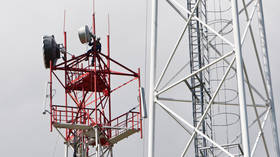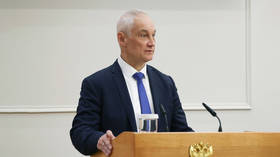Posts alleging ‘health danger’ from 5G towers land Russian citizen fine for disinfo as new ‘super fast’ network piloted in Moscow

A court in the remote Far Eastern Russian region of Chukotka has handed down a fine to a resident accused of spreading fake news online about 5G, a next-generation cellular network that promises faster connections for users.
The local regional prosecutor announced on Monday that “routine monitoring of the internet revealed that a resident of [the city of] Anadyr disseminated inaccurate information about the dangers of cellular communication devices in a public messenger group.”
The capital of the sparsely-populated Chukotka region, Anadyr is home to 13,000 people and located over 6,000 kilometers from Moscow. The area is unlikely to be among the first to see 5G networks rolled out in Russia.
Also on rt.com First super-fast 5G network launched in Russia“After consideration of the case by a magistrate… the guilty person was found responsible and handed a fine of 15,000 rubles ($205),” officials confirmed. The Znak news site later reported that the case related to posts “that 5G towers allegedly negatively affect human health.”
The prosecutor's office reminded residents that “for the dissemination of unreliable socially significant information that posed a threat to the life and health of citizens, property, the threat of massive disruption of public order and public safety, or the threat of interfering with the functioning of life support facilities, liability is provided in the form of a fine of up to 100 thousand rubles ($1,370).” Resource-rich Chukotka has one of Russia’s highest official average salaries according to state statistics, with residents taking home around $1,441 each month.
The 5G transition has provided material for internet conspiracies, with social media groups, websites and blogs dedicated to warning about its supposed impact on human health. The technology is planned as a successor to current 4G networks, which currently provide connectivity for most smartphones.
It offers faster download and upload speeds in part by using higher-frequency radio waves than was previously the case.
Scientists and health officials have sought to reassure the public that all available evidence suggests that the technology is harmless to humans and broadcast towers set up as part of the networks are no more dangerous than their 4G predecessors. However, in 2019, Dr. Joel Moskowitz, the director of the Center for Family and Community Health in the School of Public Health at the University of California, Berkeley wrote an opinion article for Scientific American in which he argued that “contrary to what some people say, there could be health risks.”
Also on rt.com Moscow joins 5G club as ultrafast next-generation internet service arrives at some of Russian capital’s most iconic spots (VIDEO)Early last year, telecommunications industry officials in the UK warned that 77 cell phone towers, many unrelated to 5G, had been the target of vandalism and arson. Engineers working on masts had also been attacked, with one hospitalized after being stabbed by a member of the public.
Russian cell phone operator MTS announced at the start of March that it was switching on the country’s first 5G network, covering a number of popular sites.
“After multiple tests and trial versions in the 5G area, our company has launched the first mass-scale pilot fifth-generation network in Russia, which is available to thousands of our clients in real-life conditions,” MTS President Alexey Kornya told journalists. It will enable users to download data with speeds of up to 1.5 gigabits per second. The average film, with a file size of around 10 gigabytes, can be downloaded in less than one minute.
If you like this story, share it with a friend!














